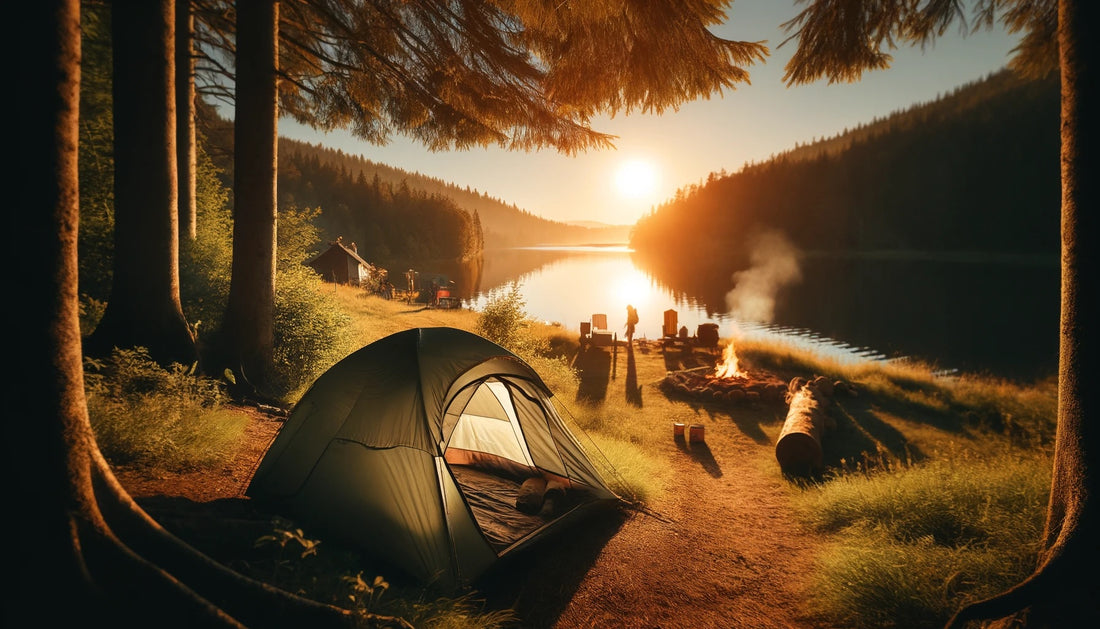
Tent Camping This Summer: Embracing Nature
Share
Camping is one of the best ways to reconnect with nature and enjoy the outdoors. From hiking through scenic trails to stargazing at night, tent camping offers a unique opportunity to fully immerse yourself in the natural beauty of summer.
Benefits of Connecting with Nature:
- Mental Clarity: The serene surroundings of forests, lakes, and mountains help reduce stress and improve mood. Studies have shown that spending time in nature can lower cortisol levels and promote a sense of well-being.
- Mindfulness: Nature encourages living in the moment and appreciating simple pleasures like the sound of rustling leaves, the sight of a deer crossing the trail, or the warmth of the sun on your face. This mindfulness enhances mental health.
- Creativity Boost: Nature has been shown to inspire creativity and new perspectives. Being away from electronic devices and immersed in the beauty of the natural world can stimulate fresh ideas and solutions.
Activities to Connect with Nature:
- Hiking and Trekking: Explore the diverse landscapes and trails of national parks.
- Wildlife Watching: Observe birds, deer, and other wildlife in their natural habitats.
- Stargazing: Enjoy breathtaking views of the night sky away from city lights.
2. Budget-Friendly Adventure
Tent camping provides an affordable vacation option compared to expensive hotels and resorts. With a tent, sleeping bag, and basic camping gear, you can explore new destinations without breaking the bank.
Tips for Budget-Friendly Camping:
- Public Campgrounds: Stay at public campgrounds managed by national or state parks for low fees. Many offer amenities like showers, picnic areas, and ranger-led activities.
- DIY Meals: Cook your own meals using portable stoves or grills to save money. Bring non-perishable items like canned beans, pasta, and oatmeal, along with a portable cooler for fresh food.
- Second-Hand Gear: Purchase or borrow second-hand camping gear. Local thrift shops, online marketplaces, and outdoor gear swaps are excellent sources for affordable equipment.
Sample Budget Breakdown for a Camping Trip:
- Tent (Second-Hand): $50
- Campground Fees (National Park): $20/night
- Food (3 Days): $30
- Fuel/Transportation: $40
- Total Cost for a 3-Day Trip: $190
3. Sustainable Travel
Tent camping aligns perfectly with sustainable travel practices, as it minimizes carbon emissions and environmental impact compared to other vacation options. With thoughtful planning, tent camping can be both enjoyable and eco-friendly.
Sustainable Camping Practices:
- Leave No Trace: Pack out all trash and minimize disturbances to natural areas. Follow the "Leave No Trace" principles by sticking to trails and avoiding disturbing wildlife.
- Eco-Friendly Gear: Opt for biodegradable soap, solar-powered lanterns, and reusable utensils. Invest in a high-quality water filter to reduce plastic waste from bottled water.
- Support Local: Purchase supplies from local vendors and respect the local culture. Engage with local communities by attending farmer's markets, joining guided tours, or hiring local guides.
Sustainable Alternatives to Common Camping Gear:
- Disposable Plates & Cutlery: Replace with reusable bamboo or stainless steel utensils.
- Plastic Water Bottles: Use a hydration pack or metal water bottle instead.
- Chemical Insect Repellents: Try natural alternatives like citronella candles or essential oils.
4. Adapt to Climate Change Challenges
With climate change altering weather patterns, tent camping requires careful planning and adaptability to ensure safety and comfort. Summer weather can be unpredictable, with sudden storms, heat waves, or wildfires posing potential risks.
Tips for Climate-Adaptive Camping:
- Monitor Weather Forecasts: Check local weather forecasts and alerts before heading out. Have a plan for alternative shelter if severe weather strikes.
- Heat Precautions: Stay hydrated, use sunscreen, and seek shade during peak hours. Wear lightweight, moisture-wicking clothing and consider setting up a shade canopy.
- Wildfire Awareness: Learn about local fire risks and follow all campfire safety guidelines. Consider using a portable camping stove instead of a traditional campfire.
- Storm Preparedness: Secure your tent with strong stakes and avoid low-lying areas prone to flooding. Consider a tent with a reinforced frame and a high water column rating.
Regional Climate Challenges:
- Western U.S.: Wildfires and droughts require water conservation and fire safety measures.
- Eastern U.S.: Hurricanes and thunderstorms necessitate securing campsites and gear.
- Mountain Regions: Rapid temperature changes require layered clothing and proper shelter.
5. Physical and Mental Health Benefits
Camping promotes a healthy lifestyle through physical activities like hiking, swimming, and fishing. Additionally, the tranquility of nature enhances mental well-being, offering relaxation and mindfulness.
Health Benefits of Tent Camping:
- Exercise: Hiking and swimming keep you active and fit. Hiking can burn up to 500 calories per hour, while swimming in natural bodies of water builds muscle strength and improves cardiovascular health.
- Fresh Air: Breathing clean, fresh air improves lung health and reduces stress. Forests and green spaces are known to have higher oxygen levels, benefiting both body and mind.
- Sleep Quality: Natural light exposure helps regulate sleep cycles. The absence of artificial lighting allows your body to follow its natural circadian rhythm.
Additional Health Benefits:
- Vitamin D Boost: Sunlight exposure stimulates vitamin D production, which is essential for bone health and immunity.
- Reduced Screen Time: Disconnecting from electronic devices encourages face-to-face interactions and reduces eye strain.
- Enhanced Mindfulness: Nature reduces rumination and fosters a peaceful state of mind.
6. Tips for Environmentally Friendly Tent Camping
Camping responsibly means minimizing your impact on the environment. Follow these tips to ensure a green camping experience:
- Choose Durable Gear: Invest in high-quality camping gear to reduce waste. Opt for long-lasting tents, sleeping bags, and cookware to avoid frequent replacements.
- Pack Reusable Supplies: Bring reusable containers, utensils, and water bottles. A collapsible silicone container set is lightweight and versatile for storing leftovers.
- Respect Wildlife: Observe animals from a distance and never feed them. Feeding wildlife can disrupt their natural behaviors and diet.
- Stay on Marked Trails: Prevent erosion by sticking to designated paths. Venturing off-trail can damage fragile plant life and disturb animal habitats.
- Waste Management: Carry a small compostable bag for organic waste and a separate bag for recyclables. Dispose of waste only at designated disposal sites.
- Campfire Safety: If allowed, use an existing fire ring and keep fires small. Always extinguish your campfire fully before leaving.
7. Conclusion
Tent camping this summer provides a fantastic opportunity to enjoy nature, prioritize sustainability, and adapt to changing climate patterns. By following environmentally friendly camping practices and planning ahead, you can create memorable outdoor adventures that benefit both you and the environment.
